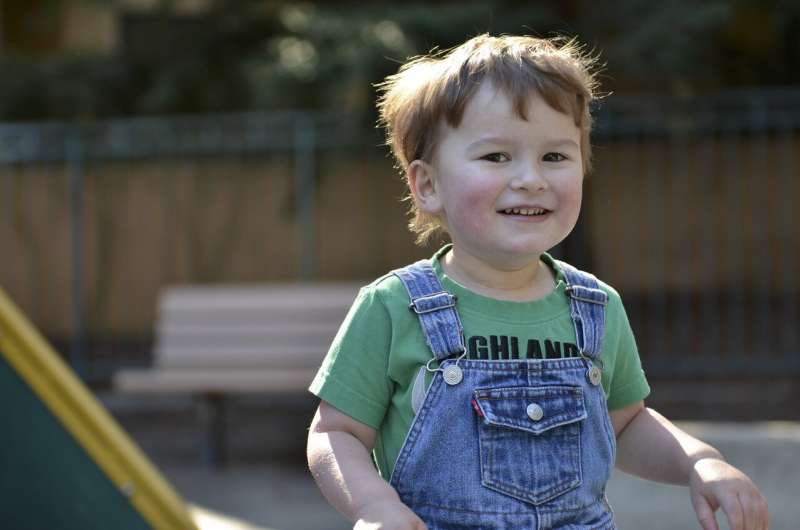October 22, 2019 feature
Inflammation and autism—an important piece of the puzzle

Autism spectrum disorder has neither a distinct pathogenesis nor pharmaceutical treatment, yet evidence continues to mount demonstrating immune dysfunction and inflammation in specific brain regions of children diagnosed with the neurodevelopmental condition.
A collaborative group of researchers in Boston and Italy has discovered that pro- and anti-inflammatory cytokines apparently play roles in autism spectrum disorder, ASD. The team was able to prove a cascade of cytokines is associated with autism by studying the post-mortem brain tissue of eight children who had been diagnosed with ASD prior to death.
Writing in the Proceedings of the National Academy of Sciences, Susan Leeman of Boston University along with Irene Tsilioni and Theoharis C. Theoharides of Tufts University, describe cytokine influences that are unique to autism. The scientists pinpointed interleukins—cytokines—that flourish in regions of the brain associated with behavior.
The persistent presence of inflammatory markers, such as certain interleukins (abbreviated by the letter IL), provides a telltale sign that inflammation plays an important role in autism, these scientists say.
"The data presented here highlight the connection between inflammation and autism spectrum disorder," Leeman and her colleagues reported in PNAS. "IL-37, an anti-inflammatory cytokine, is increased along with the pro-inflammatory cytokine IL-18 and its receptor IL-18R in the amygdala and dorsolateral prefrontal cortex of children with autism spectrum disorder."
In addition to the scientists from Boston University and Tufts, researchers from Harvard University and the University of Chieti in Pescara, Italy, participated in the groundbreaking investigation that identified the activity of the interleukins and other biologically active proteins in ASD.
The investigators contend in their research paper that because IL-37 is produced in an effort to quell the flow of pro-inflammatory proteins, the development of IL-37 as a potential therapeutic agent could provide the first targeted medication for ASD.
An interleukin-derived medication is not an offbeat idea because interleukin-based agents are used in the treatment of cancer to boost the immune response. In ASD, IL-37 would tamp down other inflammatory proteins. In the body, the interleukins are involved in a vast array of activities, including cell signaling and both triggering and tamping down inflammation.
To prove that pro- and anti-inflammatory cytokines are active in the amygdala and dorsolateral prefrontal cortex of the brains of children with autism specrtrum disorder, the investigators compared their findings to specimens from children who had not been diagnosed with the condition. Samples from the controls showed no evidence of warring cytokine influences.
Leeman, Tsilioni and colleagues say other inflammatory proteins also hold sway in the brains of children with autism, such as interleukin-1-beta. "A number of inflammatory molecules, such as interleukin-1β, tumor necrosis factor, and chemokine ligand 8, have been shown to be increased in the serum, cerebrospinal fluid, and brain of many patients with ASD.
"We had previously reported increased levels of neurotensin in the serum of children with ASD compared to non-ASD controls. Our laboratory demonstrated that neurotensin stimulates gene expression and secretion of the pro-inflammatory cytokine IL-1β and the chemokine ligand 8 from cultured human microglia.
"A number of other authors have reported the activation of microglia in the brains of children with ASD, supporting the presence of inflammation," Leeman and her colleagues reported.
Autism spectrum disorders affect one in every 59 children in the United States, according to data from the Centers for Disease Control and Prevention. The condition is increasing worldwide, particularly in Western countries.
The condition differs from one child to the next, even in families with more than one affected child. But there are certain commonalities, experts say, that allow doctors to diagnose the condition in children as young as two years old.
Currently, physicians diagnose the neurodevelopmental condition based on behavioral symptoms. Children with an autism spectrum disorder frequently indulge in repetitive behaviors. They may, for example, rock back and forth or spin in circles. Some have arcane interests, such as preferring toys of only one color.
Impaired communication is another symptom that experts assess. Some children do not speak, even when they are long past the milestone when speech is expected. Others do not make eye contact or play with siblings.
The new research arrives as yet another team of Boston scientists, who studied post-mortem brain tissue from children diagnosed with autism, also found evidence of inflammation. That Boston team, based at Beth Israel Deaconess Medical Center, tracked the telltale signs of an immune system attack in specific brain regions of children with ASD.
Dr. Matthew P. Anderson, a physician-scientist at the medical center, discovered an accumulation of immune system cells surrounding blood vessels in the brain. He also discovered mystifying blister-like formations that scientists call "blebs," which had gathered around what Anderson and colleagues referred to as "cuffed blood vessels."
Anderson and his collaborators, who reported their research in the Annals of Neurology, additionally found that the blebs contained debris from astrocytes, a type of brain cell. Although not previously linked with autism, the type of lymphocyte cuffing that Anderson identified is a well-known sign of chronic brain inflammation.
Leeman, Tsilioni and their team, meanwhile, are convinced that inflammation is an important factor in ASD. Scaling up IL-37 as a therapeutic for the condition could eventually provide the first medication for the neurodevelopmental condition, they say.
More information: Irene Tsilioni et al. IL-37 is increased in brains of children with autism spectrum disorder and inhibits human microglia stimulated by neurotensin, Proceedings of the National Academy of Sciences (2019). DOI.org/10.1073/pnas.1906817116
© 2019 Science X Network




















